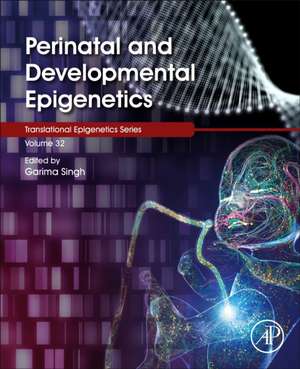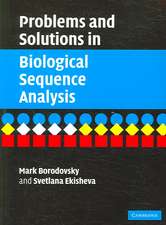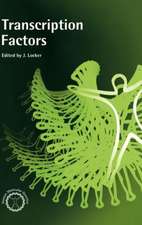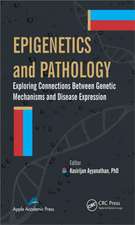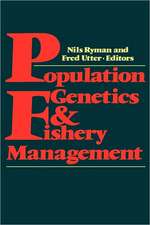Perinatal and Developmental Epigenetics: Translational Epigenetics, cartea 35
Editat de Garima Singhen Limba Engleză Paperback – 4 dec 2022
Insights and suggestions for future research illuminate approaches for identifying individual disease susceptibility. Concluding chapters highlight preventative and targeted therapeutic pathways to improve quality of life into adulthood.
- Examines disease onset stemming from epigenetic changes during the perinatal periods
- Features contributions from international experts in the field, including basic biology, disease research and drug discovery
- Offers intervention strategies to mitigate adverse developmental programming to improve health outcomes
Din seria Translational Epigenetics
- 18%
 Preț: 553.82 lei
Preț: 553.82 lei - 19%
 Preț: 659.12 lei
Preț: 659.12 lei - 23%
 Preț: 1206.43 lei
Preț: 1206.43 lei - 28%
 Preț: 915.82 lei
Preț: 915.82 lei - 24%
 Preț: 519.00 lei
Preț: 519.00 lei - 9%
 Preț: 783.84 lei
Preț: 783.84 lei - 23%
 Preț: 824.68 lei
Preț: 824.68 lei - 26%
 Preț: 949.33 lei
Preț: 949.33 lei - 27%
 Preț: 924.87 lei
Preț: 924.87 lei - 27%
 Preț: 804.68 lei
Preț: 804.68 lei - 27%
 Preț: 919.72 lei
Preț: 919.72 lei - 23%
 Preț: 918.41 lei
Preț: 918.41 lei - 28%
 Preț: 910.33 lei
Preț: 910.33 lei - 24%
 Preț: 956.09 lei
Preț: 956.09 lei - 26%
 Preț: 694.46 lei
Preț: 694.46 lei - 9%
 Preț: 1147.82 lei
Preț: 1147.82 lei - 19%
 Preț: 833.02 lei
Preț: 833.02 lei - 27%
 Preț: 848.75 lei
Preț: 848.75 lei - 24%
 Preț: 846.30 lei
Preț: 846.30 lei - 22%
 Preț: 684.94 lei
Preț: 684.94 lei - 23%
 Preț: 794.89 lei
Preț: 794.89 lei - 24%
 Preț: 799.69 lei
Preț: 799.69 lei - 22%
 Preț: 940.43 lei
Preț: 940.43 lei - 9%
 Preț: 799.39 lei
Preț: 799.39 lei - 21%
 Preț: 942.98 lei
Preț: 942.98 lei - 25%
 Preț: 727.60 lei
Preț: 727.60 lei - 23%
 Preț: 810.69 lei
Preț: 810.69 lei - 23%
 Preț: 789.43 lei
Preț: 789.43 lei - 23%
 Preț: 791.73 lei
Preț: 791.73 lei - 23%
 Preț: 812.29 lei
Preț: 812.29 lei - 23%
 Preț: 803.71 lei
Preț: 803.71 lei - 28%
 Preț: 703.10 lei
Preț: 703.10 lei - 25%
 Preț: 872.39 lei
Preț: 872.39 lei - 29%
 Preț: 827.81 lei
Preț: 827.81 lei - 20%
 Preț: 711.92 lei
Preț: 711.92 lei - 23%
 Preț: 729.96 lei
Preț: 729.96 lei - 23%
 Preț: 805.50 lei
Preț: 805.50 lei
Preț: 967.96 lei
Preț vechi: 1325.98 lei
-27% Nou
Puncte Express: 1452
Preț estimativ în valută:
185.24€ • 201.14$ • 155.60£
185.24€ • 201.14$ • 155.60£
Carte tipărită la comandă
Livrare economică 22 aprilie-06 mai
Preluare comenzi: 021 569.72.76
Specificații
ISBN-13: 9780128217856
ISBN-10: 0128217855
Pagini: 404
Ilustrații: 80 illustrations (40 in full color)
Dimensiuni: 191 x 235 x 27 mm
Greutate: 0.69 kg
Editura: ELSEVIER SCIENCE
Seria Translational Epigenetics
ISBN-10: 0128217855
Pagini: 404
Ilustrații: 80 illustrations (40 in full color)
Dimensiuni: 191 x 235 x 27 mm
Greutate: 0.69 kg
Editura: ELSEVIER SCIENCE
Seria Translational Epigenetics
Cuprins
Section I: The ever-growing complexity of epigenetic regulation of gene expression
1. Epigenetic regulation of gene expression: An overview of classical and recently discovered novel players: -Role of DNA methylation, Role of Histone modifications, Role of non-coding RNAs
2. Epigenetic regulation of transposable elements and their impact on developmental processes
3. Epigenetic regulation of germ cells
4. Epigenetic regulation of cis-regulatory elements and transcription factors during development
5. Genomic imprinting and developmental physiology: Intrauterine growth and postnatal period
6. Metabolic regulation of epigenetic processes
7. Role of RNA epigenetics in development
Section II: Epigenetic programming of the placenta regulates short-term and long-term health outcomes
8. Epigenetic regulation of placental function
9. Role of placenta in developmental programming of sex-specific adult outcomes
10. Epigenetic changes induced by Assisted Reproductive Technologies (ART) in the placenta and its effect on developmental outcomes
Section III: Epigenetics, hormones, sex and developmental programming
11. Epigenetic and hormone interaction and effect on gene regulation during prenatal and early postnatal life
12. Role of epigenetics in shaping the sex difference in immune function during development
13. Role of epigenetics in shaping sex differences in brain development and behavior
14. Role of epigenetics in shaping sex differences in heart development and later life cardiovascular disease risk
Section IV: Epigenetic programming by adverse perinatal influences
15. Early life endocrine disruptors exposure and epigenetic programming
16. Early life stress exposure and epigenetic programming
17. Early life nutrition and epigenetic programming
18. Early life air pollution exposure and epigenetic programming
19. Early life substance abuse and epigenetic programming
Section V: Advancing translational epigenetic research
21. Modelling early life adversity in the laboratory –: Animal models, their advantages and challenges in extrapolating findings from animal studies to humans
22. Clinical evidence of developmental programming due to early life exposures and long-term effects: Implications for public health
23. Phenotypic plasticity: Adaptive vs Maladaptive response and epigenetic changes
24. Epigenomics: A road to genome-wide characterization of epigenetic changes during development and identifying future individuals at risk of disease susceptibility
Section VI: Pharmacological and non-pharmacological approaches to reprogram the developmental programming to improve the health outcomes
26. Epigenetic signatures as biomarkers of early life experiences
27. Environmental enrichment and its effect on modifying the epigenetic changes induced by early life adversity
28. Dietary targeting of epigenome and its effect on early life adverse influences
29. Early postnatal maternal care and epigenetic programming of HPA axis activity
30. Emerging field of epigenetic editing: Implication for translational purposes for diseases with developmental origin and sex bias
1. Epigenetic regulation of gene expression: An overview of classical and recently discovered novel players: -Role of DNA methylation, Role of Histone modifications, Role of non-coding RNAs
2. Epigenetic regulation of transposable elements and their impact on developmental processes
3. Epigenetic regulation of germ cells
4. Epigenetic regulation of cis-regulatory elements and transcription factors during development
5. Genomic imprinting and developmental physiology: Intrauterine growth and postnatal period
6. Metabolic regulation of epigenetic processes
7. Role of RNA epigenetics in development
Section II: Epigenetic programming of the placenta regulates short-term and long-term health outcomes
8. Epigenetic regulation of placental function
9. Role of placenta in developmental programming of sex-specific adult outcomes
10. Epigenetic changes induced by Assisted Reproductive Technologies (ART) in the placenta and its effect on developmental outcomes
Section III: Epigenetics, hormones, sex and developmental programming
11. Epigenetic and hormone interaction and effect on gene regulation during prenatal and early postnatal life
12. Role of epigenetics in shaping the sex difference in immune function during development
13. Role of epigenetics in shaping sex differences in brain development and behavior
14. Role of epigenetics in shaping sex differences in heart development and later life cardiovascular disease risk
Section IV: Epigenetic programming by adverse perinatal influences
15. Early life endocrine disruptors exposure and epigenetic programming
16. Early life stress exposure and epigenetic programming
17. Early life nutrition and epigenetic programming
18. Early life air pollution exposure and epigenetic programming
19. Early life substance abuse and epigenetic programming
Section V: Advancing translational epigenetic research
21. Modelling early life adversity in the laboratory –: Animal models, their advantages and challenges in extrapolating findings from animal studies to humans
22. Clinical evidence of developmental programming due to early life exposures and long-term effects: Implications for public health
23. Phenotypic plasticity: Adaptive vs Maladaptive response and epigenetic changes
24. Epigenomics: A road to genome-wide characterization of epigenetic changes during development and identifying future individuals at risk of disease susceptibility
Section VI: Pharmacological and non-pharmacological approaches to reprogram the developmental programming to improve the health outcomes
26. Epigenetic signatures as biomarkers of early life experiences
27. Environmental enrichment and its effect on modifying the epigenetic changes induced by early life adversity
28. Dietary targeting of epigenome and its effect on early life adverse influences
29. Early postnatal maternal care and epigenetic programming of HPA axis activity
30. Emerging field of epigenetic editing: Implication for translational purposes for diseases with developmental origin and sex bias
